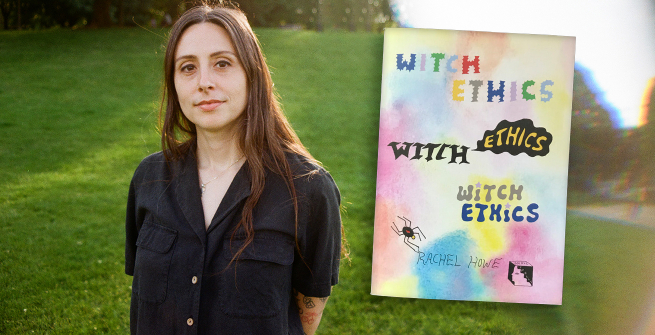Rachel Howe is an artist and healer, who created her multidimensional brand Small Spells in 2013, after graduating from Parsons School of Design and working in the art world in New York for over a decade. Along with producing objects and garments with her original designs, she provides inspiration and healing through private tarot readings, reiki sessions, and hand-poked tattoos, as well as regular astrology posts and channeled messages on her Instagram feed, @smallspells. Her work empowering others to find their way to healing also takes the form of teaching workshops on tarot and accessing intuition, and the ethics of working with energy. In 2016, she illustrated, designed, and released the Small Spells tarot deck, with an accompanying guidebook. She has also released books on astrology and essays on healing, joining psychology and spirituality with a relatable modern voice. Reaching a broad audience through her illustrations that embrace mysticism while staying firmly rooted in the culture of modern design―drawing on the imagery of cartoons, tattoos, handmade illustrations, and low-fi graphic design―she has found a voice that is both accessible and aspirational. She regularly contributes astrology writing to various publications and provides illustration work for commissions such as Spotify's horoscope playlists. Her work has recently appeared in new compendiums of Tarot and Astrology by Taschen. Howe currently lives in Los Angeles.
How did you get interested in zines?
I’ve collected zines since I was a teenager. I never really made any until more recently, but I’ve always been attracted to personal stories, and to the combination of writing and art to tell a story. In my childhood, until I was about 10, we didn’t have a TV and so I read a ton of comics and cartoon collections, so that might have informed my interest in zines as well. When I would come across zines in my youth, it felt like finding a secret, or a private portal into someone else’s life experience.
What are your zines about?
My zines are small self-published books about topics that I like to explore through writing, like energy, intuition, tarot, and astrology. I also have some zines that are just collections of drawings that tell a story through their groupings.
What are some of your favorite zines and zine makers?
I have a stack of collected zines that range from academic writings to personal diaries, that you inspired me to pull out and look at! The thing that ties them together as zines is that they are direct expressions, without the interjection of another person or group’s opinion. My friend Clay Hickson has put out some great zines of his own work, as well as printing ones for others under his press Caboose (formerly Tan & Loose). I have zines of artworks by friends, activist zines about prison labor and anti-colonialism resistance, and zines made by graffiti artists, among others.
Your zines are in our library collection for patrons to borrow. What do you think about that?
I think the more that zines are shared, the better! When we look at published books, we tend to take the contents as more authoritative truth, while a handmade zine shows us more of a relatable perspective. While books lecture to us, zines are more of a conversation between people.
What do you think is the future of zines?
Hopefully people will continue to prioritize the small but mighty efforts of personal stories and explorations that we find in zines. There is a lot of freedom when you’re putting out a small expression of the self, that doesn’t cost much and so doesn’t need to produce value in some way, aside from resonating with the select group of readers who might find it.
Why are zines important?
I think people should feel that putting something out into the world is totally possible, without the approval or support of larger institutions. Once people’s stories and ideas are filtered through institutional agendas, what makes them unique and special can sometimes be lost, or homogenized. I think we need to see a variety of perspectives and ideas, not just ones that are already validated or valued. And getting to see thoughts translated more directly from someone’s mind into book form, like in a zine, is such a privilege, and so fun.




